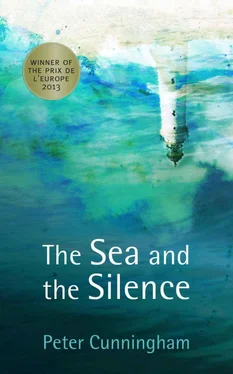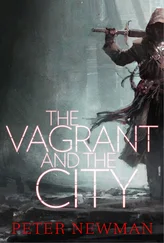‘Ronnie?’
His sports jacket was thrown on the chair in the kitchen.
‘Ronnie? Are you up there?’
An open window banged somewhere.
‘Ronnie?’
I climbed the curving stone stairs and yearned for Dublin, a place I knew little of, but where we would at least have some money. The door to his room stood ajar.
‘Are you in there?’
I walked in and saw the open window through which years ago I had thrown everything he had owned. I stood at it and saw a pink head floating twenty yards out to sea.
‘Ronnie!’
He turned around.
‘Come on in!’ he cried. ‘It’s magnificent!’
They prayed for rain at Mass in Sibrille at the end of June. People spoke of ground like rock, of meadows that had been left too scorched to cut, of crazed cattle stampeding for water. When the rain did come in the first week of July, it washed down the hill of the village, taking weeks of dung and dead flies with it. One day the sea had lain like blue silk, the next it stood rearing, outraged and black as ink. I felt the opportunity slipping, as if Dick Coad’s advice had put my resolve into a neutral gear so that my common sense was ebbing. Money was desperately short. Ronnie was considering signing on the unemployment register in Monument, an action that would, we knew, cause a sensation. We had no telephone, the man who had come to cut off the electricity had been narrowly persuaded to come back in a week when there would be a cheque and I had not settled our grocery account in Wise’s since the previous March. And yet Ronnie had an old lift in his gait. He got his petrol on tick from a variety of places and kept alluding to the substantial deal he was coaxing along, the one that would ‘set us up’. I hated his deals. I hated his ‘foraging’, his being out late at night, the distance that came between us whenever things went well for him and he didn’t need me. In Dublin, he could sign on for welfare payments and no one would give a damn. He might even get a job. Dick Coad might be wise in one respect, but in the main thrust of what I knew was right for us, he had erred. I got up one morning after Ronnie had left and drove into Monument in a downpour.
I felt ashamed for not spending more time with Langley — Ronnie had not been to see him since Christmas — but the County Home was a grim ordeal for visitors, stinking as it did of cheap food and bladder. Yet to those like Langley, clinging with grim determination to three meals a day and life, it was a home. I passed the gates and prayed that his merciful release would not be too much longer. Dick Coad was not in. His sister who sold stationery from the shop downstairs had no idea where he was.
‘Will it ever stop?’ she asked as we stood in her shop looking out at the rain.
It was too wet to shop and, anyway, I had no money. With wipers whirring, I drove out on to Long Quay, already under an inch of water. Through a lapping tide, I marvelled at how a town that a week ago had spoken of water rationing now resembled Venice. Short of the Commercial Hotel, a large woman, soaked, was lugging along a heavy suitcase. As I passed, she turned.
‘Bibs?’
Hair was stuck to Bibs Toms’s big cheeks.
‘Christ,’ she said as she got in, ‘I had forgotten quite how hopeless they are in this town’.
‘What a nice surprise.’
‘I must have waited at the station for three-quarters of an hour for a taxi that never came.’
‘I’ll bring you home.’
Steam rose from Bibs as we met open country and the rain eased.
‘This is Langley’s old car, isn’t it? Is he still..?’
‘Yes. But he might as well be dead, poor man.’
‘He was my hero as a child. No one crossed country like old Captain Shaw.’
‘You must like Dublin. I heard you have a very good job.’
‘Well, a job.’ Bibs snorted and squeezed her hair into a queue. ‘I work in a shop, if you must know. We sell wool.’
‘I’m sure it’s interesting.’
‘It’s dreadful.’ Then Bibs smiled. ‘But on Saturday afternoons, I take a bus to Rathfarnham and ride out hunters for a businessman.’
‘So you’ve two jobs, that’s clever.’
‘Oh, I don’t charge him, I just do it for the love.’
Exactly half way to Sibrille was Toms Cross. The right-hand road doubled back for more than two miles before the first acres of the Toms’s land was reached.
‘We had the best hunt in memory from a meet here,’ Bibs said. ‘The fox ran all the way to Eillne, can you believe.’
‘How often do you come home?’
‘Not a lot. It’s too expensive. Besides, I have my horses in Dublin now.’
‘Your sister’s a pretty girl,’ I said as the road wound around and the summer hedges began to wetly scrape the windows. ‘Hector was very taken with her.’
‘She wrote to say something dreadfully important is happening and that I must come home at once,’ Bibs said. She shivered. ‘Hope she hasn’t got herself pregnant with that Beasley creature.’
‘It’s a big undertaking for a girl to run on her own. She’s very brave,’ I said as we drove in by gateless piers.
‘And looks after Father, another disaster. D’you mind going to the front door? It’s less carrying with this damn case.’
From the front, the old house appeared uninhabited. The lower windows were shuttered, the paint of the hall door hung in great, drooping tongues and ivy had run amok into the eaves and was threatening the chimneys. Bibs got out and put her suitcase by the boot-scrape.
‘Come in and have tea.’
‘I should get home.’
‘Just for ten minutes,’ said Bibs and led the way around the side.
We squeezed in past laurel bushes and brought down cupfuls of rainwater on ourselves.
‘I have such mixed feelings about this house, Bibs was saying. ‘When I’m away from it, I think about it the whole time, about each room, about the yard and the boxes. I go to sleep every night remembering every horse that ever stabled here, even those that were in livery. I smell them. It’s ridiculous.’
We had come into a yard at the back.
‘And then when I come home, as now, with months gone by since my last visit, as soon as I arrive the whole thing begins to take on another appearance. Does that sound daft? It’s as if I’ve been remembering another place entirely when I was away, for as soon as I get here I want to leave again.’
She halted and turned to me.
‘Do you think I’m completely mad?’
I heard her and yet her words held no meaning. Nor did I see her, for I was staring at the kitchen window of the farmhouse where her sister, Lucy, naked, was braced forward over the sink, with my husband, Ronnie, behind her.
1969
For the first six months, each time I looked out of the bay window and saw a sky of racing clouds, my eyes, by reflex, sought the sea. The silence too I found eerie, especially at night. I had not realised how much part of me the ever-soughing sea had become, how the blunt crash of water on rock had become so essential. The sound of wind through trees was altogether different, sibilant, light breezes rinsing through the Dublin suburbs and leaving in their aftermath vales of stillness.
I had written and told Hector everything. He had not replied for nearly a month, a delay I found unbearable, and I waited every day for his letter as if for an imprimatur. I had letters from Rosa Santry keeping me up to date with the Monument gossip, but I found that the trivia essential to living in a community irrelevant and tiresome once one had left. I awoke one night, startled, and sat up drenched in sweat. I had had a dream, and although it was already fading, some vivid images remained: dead men in cloaks, blood in their nostrils, a copse surrounded by a waist-high wall of large, uneven stones that incorporated a fairy mound where oak trees grew at eccentric angles.
Читать дальше












![Edward Ellis - Adrift on the Pacific - A Boys [sic] Story of the Sea and its Perils](/books/753342/edward-ellis-adrift-on-the-pacific-a-boys-sic-s-thumb.webp)